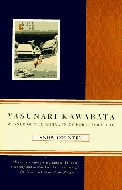The Sadness of Yasunari Kawabata
 After reading Yasunari Kawabata's Snow Country, one cannot dispel the overarching feeling of sadness that permeates the work and envelopes the reader. In my case, the very name of Kawabata is associated with sadness years after I read the work, making him probably the only writer whose literary style I could appreciate and yet decided not to read any more of his books just to escape the melancholy that gripped after reading his works.
After reading Yasunari Kawabata's Snow Country, one cannot dispel the overarching feeling of sadness that permeates the work and envelopes the reader. In my case, the very name of Kawabata is associated with sadness years after I read the work, making him probably the only writer whose literary style I could appreciate and yet decided not to read any more of his books just to escape the melancholy that gripped after reading his works.
In seeking beauty, the jaded Shimamura discovers ultimately that he can know only sadness.This sadness was no in no way unique, and was related to the military defeat of Japan in World War II.
Japanese literature was most profoundly affected by the second world war- the other one that comes to mind is the existentialist movement associated with Jean Paul- Sartre and Albert Camus in France.
Yasunari Kawabata was the first Japanese writer to be awarded the Nobel Prize in 1968. In 1972, he committed suicide by putting his head inside a gas oven.
Jason Cowley, writing in The New Statesman, provides an overview of the writer, who escaped the influence of the "proletarian wave" of the 1920s- 1930s in Japanese literature and emerged as one of the major voices of what is termed as the 'post- war' literature in Japan.
Was this sadness common to all Japanese, as he would have us believe? Or was it something much more personal, an expression of Kawabata's own ontological perplexity - the sadness of the adult who was once an orphaned child, lost and alone in the world? Whatever the origins of this sadness, Kawabata decided that, with the war's end, he would write only elegies; and so, on the whole, he did, producing some of the strangest and most memorably affecting fiction in 20th-century literature, the last major writer to work in the "classical" Japanese tradition. Today, the Japanese writers most familiar to western readers, from the Nobel laureate Kenzaburo Oe to Haruki Murakami, are inter nationalists in style, attitude and ambition, their politics largely leftist or liberal and their familiarity with popular culture - with Hollywood, the American vernacular, pop and the buzz of new technologies - obvious.
Kawabata was different. Influenced by the formal austerity and sparse, fragile lyricism of haiku, he is a miniaturist: he compresses where others seek to inflate and enlarge. His is a fiction of extreme economy, even of emptiness.
Link via The Literary Saloon
Tags: Japan, Literature, Yasunari Kawabata
No comments:
Post a Comment